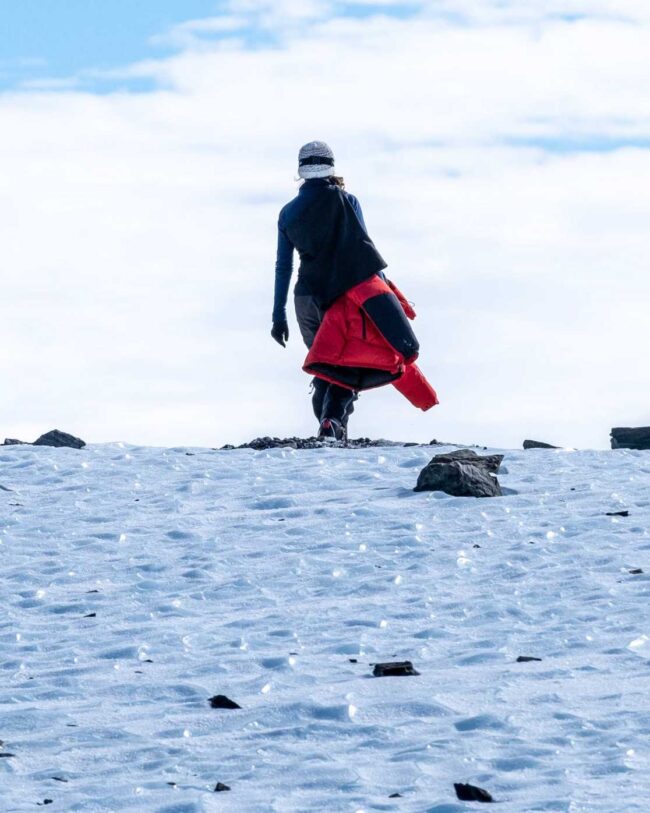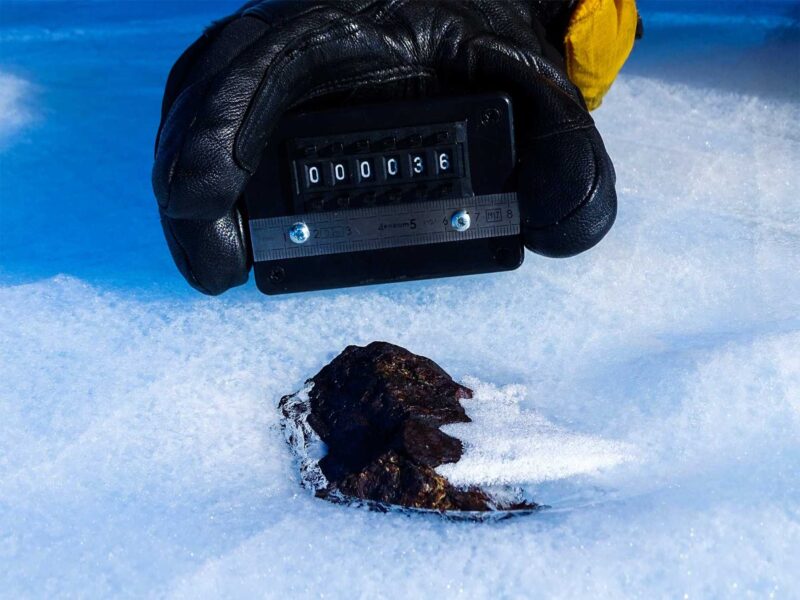The EarthSky team created this 1-minute video summary for you.
- Some 60% of meteorites – or rocks from space – are found in Antarctica. These meteorites offer key insights about how life on Earth arose and other fundamental questions.
- But Antarctica is warming, and its ice is melting. Approximately 5,000 meteorites are now being lost annually – five times the collection rate – leading to a potential loss of 3/4 of all Antarctic meteorites by 2100.
- Scientists who study Antarctic meteorites are calling for urgent international efforts to recover as many meteorites as possible before they vanish under the ice.
Antarctic meteorites are sinking through melting ice
Meteorites – or rocks from space that strike Earth’s surface – have provided a wealth of information about other bodies in our solar system. And, to date, about 60% of all meteorites ever found on Earth have been collected from the surface of the Antarctic ice sheet. The dark rocks on the white ice sheet are easy to find. And the cold, dry environment helps keep them relatively pristine, said scientists from the Switzerland and Belgium, this month.
But, along with the rest of Earth’s globe, Antarctica is warming. And these scientists said that meteorites are dropping through melting ice. They said on April 8, 2024, that for every 1/10 of a degree of warming, approximately 9,000 meteorites sink under the ice. By 2050, about a quarter of the estimated 300,000 to 800,000 meteorites in Antarctica will be lost.
That’s around 5,000 meteorites lost in Antarctica a year, or about five times the collection rate of Antarctic meteorites.
Scientists care about this because studies of meteorites collected in Antarctica have led to insights into how life arose on Earth, and how our moon was formed. The loss of Antarctic meteorites is a blow to the pursuit of knowledge. Scientists estimate that, by the year 2100, 3/4 of all Antarctic meteorites could be lost.
The recent study of their loss came from an international team of researchers who used artificial intelligence, satellite data and climate modeling to reach their conclusions. The team published their findings in the peer-reviewed journal Nature Climate Change on April 8, 2024.


Lost to melting ice
Researchers who visit Antarctica look for meteorites in areas they call meteorite stranding zones. These are regions where the flow of the ice sheet leaves a concentration of meteorites. And most meteorites have a charred crust from their fiery entry through our atmosphere, so their dark color makes them easy to spot on the white ice sheet.
So the dark color of the meteorites helps scientists locate them on the ice. But the dark color is also part of the problem. Dark colors heat up more quickly. Sunlight warms the meteorites, as it’s warming the ice the meteorites are resting upon. And thus the meteorites sink into the ice more quickly than lighter-colored objects would.
And, once the meteorites are below the ice sheet, scientists lose the ability to detect them, even at shallow depths.
Veronica Tollenaar of the Université Libre de Bruxelles said:
Even when temperatures of the ice are well below zero, the dark meteorites warm up so much in the sun that they can melt the ice directly beneath the meteorite. Through this process, the warm meteorite creates a local depression in the ice and over time fully disappears under the surface.
Climate change threatens Antarctic meteorites ??
Precious meteorites are rapidly disappearing from the ice sheet surface due to global warming. Thus, an unparalleled wealth of information on our Solar System. https://t.co/MtF4rM3ChG#Antactic #Meteorites
— ETH Zurich (@ETH_en) April 9, 2024
Save the meteorites!
Scientists who study Antarctic meteorites are calling for a major international effort to collect as many as possible before they are lost. Harry Zekollari of Vrije Universiteit Brussel in Belgium said:
We need to accelerate and intensify efforts to recover Antarctic meteorites. The loss of Antarctic meteorites is much like the loss of data that scientists glean from ice cores collected from vanishing glaciers. Once they disappear, so do some of the secrets of the universe.
Scientists are also hoping to increase the efficiency of their meteorite recovery missions. To do this, they’ll need to identify unexplored meteorite stranding zones.
The next step, they said, is to map the areas of blue ice, where most meteorite recoveries are made.
Thousands of meteorites could sink more quickly into Antarctic ice as a result of warming temperatures, accelerating the inaccessibility of many of these samples of extraterrestrial material, suggests a study published in @NatureClimate. https://t.co/mxANIjEudz pic.twitter.com/LON0GXSiPu
— Nature Portfolio (@NaturePortfolio) April 8, 2024
Bottom line: Warming temperatures are causing Antarctic meteorites to sink through melting ice. These samples of our solar system are keys to understanding earthly life. Scientists are calling for a major effort to collect as many as possible before they are gone.
Source: Antarctic meteorites threatened by climate warming
Read more: World’s largest iceberg headed toward warm waters
The post Antarctic meteorites are sinking in melting ice first appeared on EarthSky.
from EarthSky https://ift.tt/CNLvFGT
The EarthSky team created this 1-minute video summary for you.
- Some 60% of meteorites – or rocks from space – are found in Antarctica. These meteorites offer key insights about how life on Earth arose and other fundamental questions.
- But Antarctica is warming, and its ice is melting. Approximately 5,000 meteorites are now being lost annually – five times the collection rate – leading to a potential loss of 3/4 of all Antarctic meteorites by 2100.
- Scientists who study Antarctic meteorites are calling for urgent international efforts to recover as many meteorites as possible before they vanish under the ice.
Antarctic meteorites are sinking through melting ice
Meteorites – or rocks from space that strike Earth’s surface – have provided a wealth of information about other bodies in our solar system. And, to date, about 60% of all meteorites ever found on Earth have been collected from the surface of the Antarctic ice sheet. The dark rocks on the white ice sheet are easy to find. And the cold, dry environment helps keep them relatively pristine, said scientists from the Switzerland and Belgium, this month.
But, along with the rest of Earth’s globe, Antarctica is warming. And these scientists said that meteorites are dropping through melting ice. They said on April 8, 2024, that for every 1/10 of a degree of warming, approximately 9,000 meteorites sink under the ice. By 2050, about a quarter of the estimated 300,000 to 800,000 meteorites in Antarctica will be lost.
That’s around 5,000 meteorites lost in Antarctica a year, or about five times the collection rate of Antarctic meteorites.
Scientists care about this because studies of meteorites collected in Antarctica have led to insights into how life arose on Earth, and how our moon was formed. The loss of Antarctic meteorites is a blow to the pursuit of knowledge. Scientists estimate that, by the year 2100, 3/4 of all Antarctic meteorites could be lost.
The recent study of their loss came from an international team of researchers who used artificial intelligence, satellite data and climate modeling to reach their conclusions. The team published their findings in the peer-reviewed journal Nature Climate Change on April 8, 2024.


Lost to melting ice
Researchers who visit Antarctica look for meteorites in areas they call meteorite stranding zones. These are regions where the flow of the ice sheet leaves a concentration of meteorites. And most meteorites have a charred crust from their fiery entry through our atmosphere, so their dark color makes them easy to spot on the white ice sheet.
So the dark color of the meteorites helps scientists locate them on the ice. But the dark color is also part of the problem. Dark colors heat up more quickly. Sunlight warms the meteorites, as it’s warming the ice the meteorites are resting upon. And thus the meteorites sink into the ice more quickly than lighter-colored objects would.
And, once the meteorites are below the ice sheet, scientists lose the ability to detect them, even at shallow depths.
Veronica Tollenaar of the Université Libre de Bruxelles said:
Even when temperatures of the ice are well below zero, the dark meteorites warm up so much in the sun that they can melt the ice directly beneath the meteorite. Through this process, the warm meteorite creates a local depression in the ice and over time fully disappears under the surface.
Climate change threatens Antarctic meteorites ??
Precious meteorites are rapidly disappearing from the ice sheet surface due to global warming. Thus, an unparalleled wealth of information on our Solar System. https://t.co/MtF4rM3ChG#Antactic #Meteorites
— ETH Zurich (@ETH_en) April 9, 2024
Save the meteorites!
Scientists who study Antarctic meteorites are calling for a major international effort to collect as many as possible before they are lost. Harry Zekollari of Vrije Universiteit Brussel in Belgium said:
We need to accelerate and intensify efforts to recover Antarctic meteorites. The loss of Antarctic meteorites is much like the loss of data that scientists glean from ice cores collected from vanishing glaciers. Once they disappear, so do some of the secrets of the universe.
Scientists are also hoping to increase the efficiency of their meteorite recovery missions. To do this, they’ll need to identify unexplored meteorite stranding zones.
The next step, they said, is to map the areas of blue ice, where most meteorite recoveries are made.
Thousands of meteorites could sink more quickly into Antarctic ice as a result of warming temperatures, accelerating the inaccessibility of many of these samples of extraterrestrial material, suggests a study published in @NatureClimate. https://t.co/mxANIjEudz pic.twitter.com/LON0GXSiPu
— Nature Portfolio (@NaturePortfolio) April 8, 2024
Bottom line: Warming temperatures are causing Antarctic meteorites to sink through melting ice. These samples of our solar system are keys to understanding earthly life. Scientists are calling for a major effort to collect as many as possible before they are gone.
Source: Antarctic meteorites threatened by climate warming
Read more: World’s largest iceberg headed toward warm waters
The post Antarctic meteorites are sinking in melting ice first appeared on EarthSky.
from EarthSky https://ift.tt/CNLvFGT

Aucun commentaire:
Enregistrer un commentaire